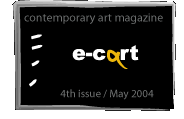






















What is Post-Communism and How to Think it?
Boris Buden
At a descriptive level Post-Communism means nothing but a condition that follows another one - the communist one? Or socialist condition as such refers to the societies which were until 1989 under the communist rule? The political theory understands this condition as a phase of historical transition and describes it as a process of transformation of a communist and/or socialist society into a capitalist and democratic one. This is the reason why the political theory doesn't understand Post-Communism as a specific historical epoch. It lacks fundamental characteristics of a historic epoch: there is no specifically post-communist political subject or system; no specifically post-communist mode of production or property form. That is the reason why the political science does not need/ does not use the concept of post-communism at all. It prefers instead another concept - the concept of Transition or, as the usual cliché says, "transition to democracy". Within the political science there is also a separate discipline that deals with the problem of transition - the Transitology. Transitology was developed in the late sixties and at that time it examined different types of regimes mostly in South America. There is also a minimalist definition of the concept of transition from that time. It says that the process of transition is nothing but "An interval between two different political regimes". (O'Donnell, Schmitter). However, the outcome of a political transition at that time was completely open. A South American military dictatorship could at that time be replaced by a liberal-democratic system, but also by a type of socialist democracy or even a kind of communist or Maoist dictatorship. Since 1989 a political transition has only one conceivable outcome - the liberal capitalist democracy. This is the reason why the Transitology understands the post-communist transition process in a completely deterministic way. In order to come to democracy, one must simply follow some objective, external factors. Sometimes this is The General Law of History (Carl Hempel); in other cases, this is economy or for instance only geography ("... geography is indeed the single reason to hope that East European countries will follow the path to democracy and prosperity." Adam Przseworski); For some Transitologists the way to democracy is determined simply by nature (John Mueller) or even according to the theory of the natural selection of Charles Darwin (Tutu Vanhanen). The outcome of today's Transition is thus in advance well-known. What stays undecided and open is only its duration. In this question one often quotes Ralf Dahrendorf, who said once that the post-communist societies need six months for issuing the constitution, six years for an institutionalizing of the Democracy - Re-establishment of the Rechtsstaat - constitutional state, political pluralism, parliamentarism etc., and sixty years for the implementation of a free democratic society. It may be also a hundred or five hundred years still for the political sciences until the days of post-communism are numbered. Therefore they are interested in the remains - political, economic, and cultural of the communist or real-socialist ancien regimes only in a pragmatic sense - to assist or help their disappearing that is anyway necessary.
II In a completely different way one deals with the remnants of communism in the cultural sphere. Here these remnants are both recollected and collected more and more intensively, and recently, in a very symptomatic way, they are also reflected. Could we even talk of an emerging post-communist memory culture that manifests itself in different forms of cultural production? Both in the mass-, and in the high culture? This phenomenon is today publicly often understood as a kind of nostalgia - in Germany - Ostalgie. This post-communist culture of memory becomes particularly visible in a proper boom of museums and exhibitions, in which the remains of the material culture of socialism are collected and displayed. The decisive question now is: What is [this thing] that politics wants to see forgotten and disappeared, and that culture, on the contrary, tries to save, recall and reflect? To my opinion it would be completely wrong to expect an answer to this question from the so called post-communist cultural studies. Why? Because this new and today rapidly expanding research field of the American anthropology and cultural studies is both spatial and temporally limited. Its concept is based on the assumption that the post-communist condition can be geographically located in the former socialist countries. So speak the authors of one post-communist studies' project about the socialism, as being an - I quote: "Euro-Asian product". So understood, the post-communist studies have always been Area studies, or, as this is explicitly called, Post-Communist and East European studies. Some of its topics [can be found in] the titles of the books recommended by the Soyuz project: Trust, Property and Social Change in a Southern Slovakian Village. /Post-communist Soviet chaos: Violence and Dispossession in Kazakhstan. /Fragmented Identities: Popular Culture, Sex, and Everyday Life in Post-Communist Romania. /Peoples of the Tundra: Northern Siberians in the post Communist Transition. Etc. On the other side the concept of the post-communist cultural studies understands its research object, the post-communism, as a phenomenon which will disappear sooner or later. Thus do the authors of one research project of post-communist studies explicitly express their hope that they will be able in the future to replace the post-communist concepts with others, that would be more long-lasting and that could apply also for the developed countries. It is clear that the project of the post-communist cultural studies remains within the conceptual context of Transitology. It is finally a kind of anthropological and/or culture-studies appendix of the Transitology.
III However, there is another kind of reflection that sees the post-communist condition as a global and/or epochal phenomenon, which can be limited neither on some geographical space, nor within the time. The fall of communism is a historic event that marks a new epochal condition which applies equally to the former socialist East and to the capitalistic democratic West and whose final outcome cannot be foreseen. I will mention here two works which reflect the post-communist condition exactly in this way: The Dreamworld and Catastrophe of Susan Buck Morss and The Requiem for Communism of Charity Scribner. Both authors assume that the fall of the socialist project is indeed only a side-effect of a much more important historical event - the epochal exhaustion of the industrial modernism and that this event equally belongs to the historical experience of the West and of the former communist East. Both believe that with the communism have also disappeared the collective utopia and/or the utopia of the collective and that this disappearing has been experienced as a loss, which today cannot be compensated. Both are convinced that this utopian experience should be today saved and remembered. And finally, both see an emancipatory potential in this rescue of the past and/or cultural memory. I would like to take the argument of Charity Scribner as an example, because she analyzes the symptoms of this utopia-loss more exactly and suggests a kind of therapy. These symptoms are, as already said, nostalgia, melancholy, mourning, collective sorrow, up to the denial. In these symptoms manifests itself the trauma of the loss of collective and solidarity, which coined/shaped the socialism. By solidarity Scribner means the experience of collective industrial labor and its direct social and political context. With the fall of socialism and the industrial modernism this experience of the solidarity and its political ideal, the welfare state have disappeared from our historical horizon. Scribner believes that in our digital age no virtual community can compensate this loss. Therefore it is of crucial importance to find in the cultural memory of socialism the place of reflection and the resistance. Scribner's Requiem for Communism suggests also a kind of therapy for this situation - the politics of memory. We can understand it as the commitment to an authentic memory. The purpose of such an authentic memory is not to repair a homogeneous picture of the past but to revive the antagonisms, which constitute the core element of our experience and work against the dissolution of each Narrative. Here, as Scribner believes, lies the emancipatory potential of such a memory politics. As an example of an authentic cultural memory Scribner takes the Offenes Depot in Eisenhüttenstadt (Ironworks City). Here have been collected and displayed the objects of the everyday life in the GDR - however in a special way. There are the people themselves who bring their own artifacts from the GDR time in the depot, and there has always existed a protocol on their motivation to do so, as well as the history of the respective article, and/or the memories which refer to this artifact. In that way the collective memory that has been shaped in the open depot is not a dead thing, which is kept in the museum as in a grave, but an act of communication. In the open depot people construct by themselves their collective memory, this means that they create the reference framework for their memories in their present. Scribner relies also explicitly on Halwachs' concept of the cultural memory.
IV Post-communism is thus the condition of an epochal loss - the loss of the collective. The way we deal with this traumatic loss has the form of the cultural memory. The paradigm of these relations to the traumatic loss - which can also be understood as a metaphor of the post-communist discourse - is the institution of the museum. There is precisely in the open depot where an authentic cultural memory can be formed and in this way the lost experience of the collective be won again. In the open depot Scribner sees a successful transition of, as she writes, the material to memory, of the collective to collection. The thesis of Scribner is that the place of the collective, which in the time of the industrial modernism was the factory, today in our postindustrial and post communist time has become the culture. Everyone who to some extent has had an experience with the post-communist condition would ask here the question - what is with the political collective that coined/shaped the post-communism so obviously and so radically? - with the nation and with its politically ideological expression - the nationalism? Scribner actually ignores completely this question. She denies the problem of nation and of nationalism. Why? It is well known that the museum is a place where not only the memory, but also the collective identity is formed. The artifacts displayed there speak to us, only as far as they become part of a larger narration - indeed those of the national collective. This narrative framework serves also a political purpose - the political administration of the identity. In his Imagined Communities Benedict Anderson has shown that the institution of the museum plays an important role not only in the nation's formation, but also during the process of the colonization. European colonial powers used the institution of the museum and in particular the ethnographic museum, in order to create artificially the collective identities of the people they wanted to subject to their administration. The museum is a place where the cultural Other is created. The same happens in the Open Depot and other museums of communism. The reminds of the socialism have become there - both in the temporal depth, and at the spatial distance - in the first place an expression of a different culture. Thus the post-communist discourse in these places of memory articulates itself necessarily as the discourse on the cultural difference. The postcolonial theory has shown that the colonial discourse is a paradigmatic example of a discourse on the cultural difference. Homi Bhabha defined the core of the colonial discourse as fetishist stereotype. Already Franz Fanon showed that cultural difference in the colonial discourse is perceived as a kind of Stereotype - for instance: the black Africans are sexually more active than Europeans; or, the Asians never tell you the truth - meaning the truth perceived according to the logic of a prefabricated knowledge. Bhabha has come to the conclusion that this stereotype is a form of Fetishism and that the fetishistic stereotype plays the key role during the process of the colonial identification. The fetishistic stereotype represents a simplified form of the identification. It serves above all one purpose - to normalize and calm down the ambivalent reaction to the traumatic cultural difference - in the same way the Fetish object does it.
V It is not difficult to see that also those artifacts in the Open Depot museum - no matter how authentically they have been collected and how authentic is the collective memory produced there - are also perceived after the logic of the fetishistic Stereotype. This is also the way we experience the socialist past, namely ambivalent: we recognize and deny them at the same time. Such memory places, however authentically, are not places, where, how Scribner believes, the antagonisms of our past are waked up and where historical dialectic can be reactivated, but rather the places, where these antagonisms in the form of ambivalences are calmed down and normalized, the places where memory is always accompanied by forgetting, by disavowal. That is the reason why Scribner neglects political framework of the collective memory, why she denies the national collective. Because it necessarily subverts the concept of an authentic memory. Anderson has already showed that memory always implies a forgetting of the traumatic sites of the antagonisms and conflicts of the past in the context of the national narration. In this context we can say that there is no memory without forgetting. In addition, to open the problem of the political condition of the collective memory, the national collective would thus disclose the fundamental contradiction in Scribner's concept: the contradiction between the transnational character of the post-communist condition and the national framework of the collective memory.
In summary I'll try to sketch out very shortly the most important conditions of a meaningful reflection of the post-communist condition: First of all, it must leave the conceptual framework of the Transitology i.e., never fix itself to a certain geographic area and to limit itself to a certain time. Secondly, as far as it is conceived as a form of the cultural memory, it should reflect critically its political conditions and in this context their fundamental problem - this is the contradiction mentioned between the transnational character of post-communism and a national character of the collective memory. In order to solve this problem, the post-communist reflection can learn from the postcolonial theory, but not in such a way that it takes over finished concepts, but identifies itself with their theoretical challenges. The most important of these challenges is the concept of a trans- or post-national culture. Their key question becomes then: How can we imagine the collective memory in the cultural space called the third space?
This text was the support for Boris Buden's lecture that he had in Bucharest, at the National University of Arts, in the frame of the Vienna Days in Bucharest, "Formate" section
|
|
 |
 |
|
|||||||||||||||||
 |
|
 |
|
|||||||||||||||||
|
|
|
|||||||||||||||||||
|
|
|
|||||||||||||||||||
 |
 |
 |
 |
 |
|
|||||||||||||||
 |
|
|||||||||||||||||||
| |
|
|
 |
|
||||||||||||||||
|
|
|
|
|
|||||||||||||||||
 |
|
|||||||||||||||||||
|
|
|
|||||||||||||||||||
| |
|
|
||||||||||||||||||
|
|
|
|
||||||||||||||||||
 |
 |
|
|
|||||||||||||||||
 |
|
|||||||||||||||||||
 |
 |
 |
|
|||||||||||||||||
|
|
 |
 |
|
|||||||||||||||||
 |
|
|||||||||||||||||||
 |
|
|||||||||||||||||||
 |
|
|||||||||||||||||||
|
|
|
|
|
|
|
|
|
|
|
|
|
|
|
|
|
|
|
|
|
|